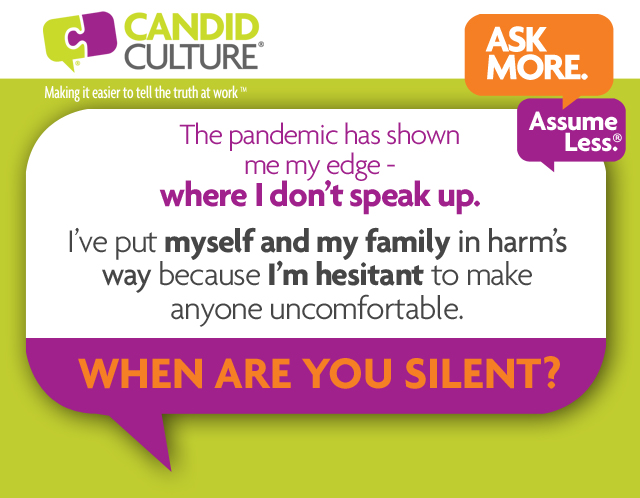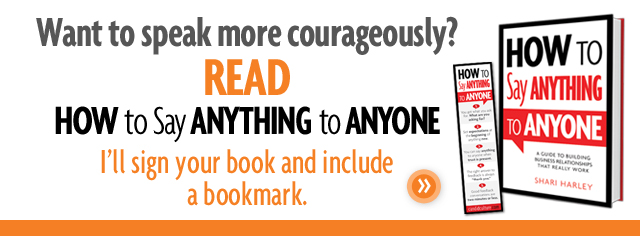When Are You Silent?
Covid-19 has shown many of us our edge – working from home for many months, not traveling, missing people we’re used to seeing, and for me, being silent when I would normally speak up.
Earlier in the fall, a friend came to bring my son a birthday present. We hadn’t seen my friend for many months. We visited outside. He didn’t wear a mask, gave Grayson a high five, and then a hug. It seemed like terrible judgment and it happened so fast before I could say anything. Then he went into my house to get a glass of water without wearing a mask while we stayed outside.
I was shocked by all of this. It didn’t seem smart or respectful. And I didn’t say anything. I still haven’t said anything. I could give you ten similar examples of instances in these past months when I was uncomfortable but didn’t say anything – sometimes with people I know, sometimes with people I don’t know.
It feels risky to write this because wearing masks and physical distancing has been so politicized. This blog post isn’t about the coronavirus and anyone’s personal choices. It’s about when we don’t speak up and why.
I think the way to handle potentially tough situations is to anticipate the unexpected and have a setting-expectation conversation before a challenge occurs. What I could have said to my friend, before he visited, was, “We are excited to see you. Let’s stay outside and let’s all wear masks.” I should have set expectations before being confronted with a difficult and awkward situation. Setting expectations is always easier than addressing behavior after it has happened.
Sometimes you can’t anticipate another person’s behavior or how a situation might go. You can’t plan for everything. And telling someone you don’t know in a store, office, or elevator that you’re uncomfortable may feel risky.

Here are four practices for making harder conversations easier and for taking care of yourself when you don’t know what to say:
- Anticipate everything that can happen.
- Decide how you want to manage situations before they happen.
- Set clear expectations before seeing people or going someplace. My son knows that if we go to a park and it’s crowded, we will leave. I tell him this before we go so, he isn’t surprised.
- Set boundaries. It’s ok to ask people in line at the grocery store to back up a few feet. “I’m trying to keep a six feet distance. Would you mind stepping back a few feet?” Yes, this likely feels very hard in the moment.
I worry about what people will think of me. I want people to like me. I’m consumed by both of these thoughts way more than you would ever guess. But what’s more important – protecting ourselves and our family or not offending a person in line at the grocery store you’ll never see again?
It needs to be ok to respectfully and kindly speak up on our own behalf. And speaking up starts by opening our mouths and saying what makes us uncomfortable again and again and again.

Tags: business communication, business relationships, how to say anything to anyone, speaking up, work from home







Well said!
What a great message. For me, it was very validating to hear I am not the only one struggling with the ability to speak up. It was also empowering to hear it’s “OK” to speak up and to be reminded why it’s so important. The safety of family and loved ones should override the discomfort of speaking up. But you’re absolutely right. It can be so hard in the moment. Thank you for acknowledging this and emphasizing the importance of setting expectations.